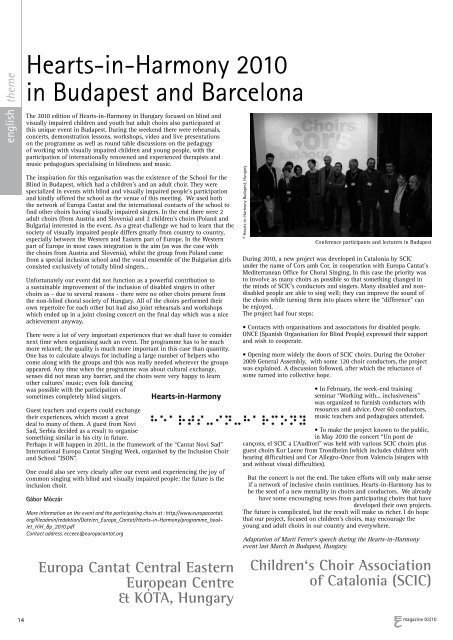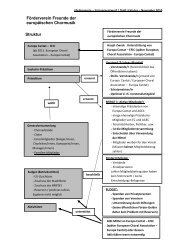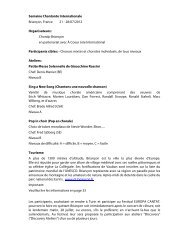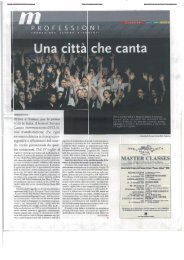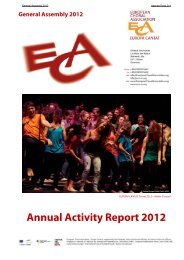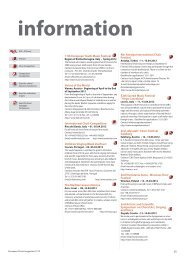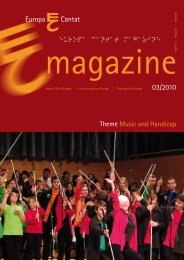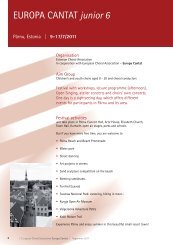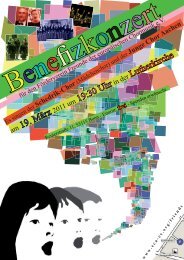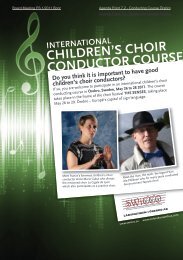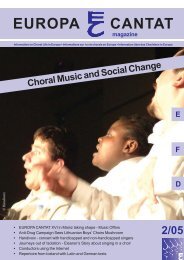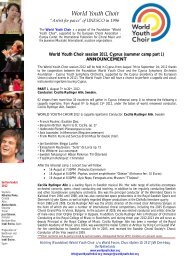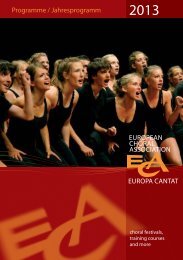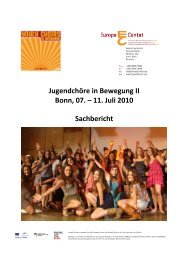Music and Handicap (Europa Cantat Magazine 03/2010) - European ...
Music and Handicap (Europa Cantat Magazine 03/2010) - European ...
Music and Handicap (Europa Cantat Magazine 03/2010) - European ...
Create successful ePaper yourself
Turn your PDF publications into a flip-book with our unique Google optimized e-Paper software.
english theme<br />
14<br />
Hearts-in-Harmony <strong>2010</strong><br />
in Budapest <strong>and</strong> Barcelona<br />
The <strong>2010</strong> edition of Hearts-in-Harmony in Hungary focused on blind <strong>and</strong><br />
visually impaired children <strong>and</strong> youth but adult choirs also participated at<br />
this unique event in Budapest. During the weekend there were rehearsals,<br />
concerts, demonstration lessons, workshops, video <strong>and</strong> live presentations<br />
on the programme as well as round table discussions on the pedagogy<br />
of working with visually impaired children <strong>and</strong> young people, with the<br />
participation of internationally renowned <strong>and</strong> experienced therapists <strong>and</strong><br />
music pedagogues specialising in blindness <strong>and</strong> music.<br />
The inspiration for this organisation was the existence of the School for the<br />
Blind in Budapest, which had a children’s <strong>and</strong> an adult choir. They were<br />
specialized in events with blind <strong>and</strong> visually impaired people’s participation<br />
<strong>and</strong> kindly offered the school as the venue of this meeting. We used both<br />
the network of <strong>Europa</strong> <strong>Cantat</strong> <strong>and</strong> the international contacts of the school to<br />
find other choirs having visually impaired singers. In the end there were 2<br />
adult choirs (from Austria <strong>and</strong> Slovenia) <strong>and</strong> 2 children’s choirs (Pol<strong>and</strong> <strong>and</strong><br />
Bulgaria) interested in the event. As a great challenge we had to learn that the<br />
society of visually impaired people differs greatly from country to country,<br />
especially between the Western <strong>and</strong> Eastern part of Europe. In the Western<br />
part of Europe in most cases integration is the aim (as was the case with<br />
the choirs from Austria <strong>and</strong> Slovenia), whilst the group from Pol<strong>and</strong> came<br />
from a special inclusion school <strong>and</strong> the vocal ensemble of the Bulgarian girls<br />
consisted exclusively of totally blind singers…<br />
Unfortunately our event did not function as a powerful contribution to<br />
a sustainable improvement of the inclusion of disabled singers in other<br />
choirs as - due to several reasons - there were no other choirs present from<br />
the non-blind choral society of Hungary. All of the choirs performed their<br />
own repertoire for each other but had also joint rehearsals <strong>and</strong> workshops<br />
which ended up in a joint closing concert on the final day which was a nice<br />
achievement anyway.<br />
There were a lot of very important experiences that we shall have to consider<br />
next time when organising such an event. The programme has to be much<br />
more relaxed; the quality is much more important in this case than quantity.<br />
One has to calculate always for including a large number of helpers who<br />
come along with the groups <strong>and</strong> this was really needed wherever the groups<br />
appeared. Any time when the programme was about cultural exchange,<br />
senses did not mean any barrier, <strong>and</strong> the choirs were very happy to learn<br />
other cultures’ music; even folk dancing<br />
was possible with the participation of<br />
sometimes completely blind singers.<br />
Guest teachers <strong>and</strong> experts could exchange<br />
their experiences, which meant a great<br />
deal to many of them. A guest from Novi<br />
Sad, Serbia decided as a result to organise<br />
something similar in his city in future.<br />
Perhaps it will happen in 2011, in the framework of the “<strong>Cantat</strong> Novi Sad”<br />
International <strong>Europa</strong> <strong>Cantat</strong> Singing Week, organised by the Inclusion Choir<br />
<strong>and</strong> School “ISON”.<br />
One could also see very clearly after our event <strong>and</strong> experiencing the joy of<br />
common singing with blind <strong>and</strong> visually impaired people: the future is the<br />
inclusion choir.<br />
Gábor Móczár<br />
More information on the event <strong>and</strong> the participating choirs at : http://www.europacantat.<br />
org/fileadmin/redaktion/Dateien_<strong>Europa</strong>_<strong>Cantat</strong>/Hearts-in-Harmony/programme_booklet_HiH_Bp_<strong>2010</strong>.pdf<br />
Contact address: ecceec@europacantat.org<br />
<strong>Europa</strong> <strong>Cantat</strong> Central Eastern<br />
<strong>European</strong> Centre<br />
& KÓTA, Hungary<br />
© Hearts-in-Harmony Budapest, Hungary<br />
Conference participants <strong>and</strong> lecturers in Budapest<br />
During <strong>2010</strong>, a new project was developed in Catalonia by SCIC<br />
under the name of Cors amb Cor, in cooperation with <strong>Europa</strong> <strong>Cantat</strong>’s<br />
Mediterranean Office for Choral Singing. In this case the priority was<br />
to involve as many choirs as possible so that something changed in<br />
the minds of SCIC’s conductors <strong>and</strong> singers. Many disabled <strong>and</strong> nondisabled<br />
people are able to sing well; they can improve the sound of<br />
the choirs while turning them into places where the “difference” can<br />
be enjoyed.<br />
The project had four steps:<br />
• Contacts with organisations <strong>and</strong> associations for disabled people.<br />
ONCE (Spanish Organisation for Blind People) expressed their support<br />
<strong>and</strong> wish to cooperate.<br />
• Opening more widely the doors of SCIC choirs. During the October<br />
2009 General Assembly, with some 120 choir conductors, the project<br />
was explained. A discussion followed, after which the reluctance of<br />
some turned into collective hope.<br />
• In February, the week-end training<br />
seminar “Working with... inclusiveness”<br />
was organized to furnish conductors with<br />
resources <strong>and</strong> advice. Over 60 conductors,<br />
music teachers <strong>and</strong> pedagogues attended.<br />
• To make the project known to the public,<br />
in May <strong>2010</strong> the concert “Un pont de<br />
cançons, el SCIC a L’Auditori” was held with various SCIC choirs plus<br />
guest choirs Kor Laene from Trondheim (which includes children with<br />
hearing difficulties) <strong>and</strong> Cor Allegro-Once from Valencia (singers with<br />
<strong>and</strong> without visual difficulties).<br />
But the concert is not the end. The taken efforts will only make sense<br />
if a network of inclusive choirs continues. Hearts-in-Harmony has to<br />
be the seed of a new mentality in choirs <strong>and</strong> conductors. We already<br />
have some encouraging news from participating choirs that have<br />
developed their own projects.<br />
The future is complicated, but the result will make us richer. I do hope<br />
that our project, focused on children’s choirs, may encourage the<br />
young <strong>and</strong> adult choirs in our country <strong>and</strong> everywhere.<br />
Adaptation of Martí Ferrer’s speech during the Hearts-in-Harmony<br />
event last March in Budapest, Hungary.<br />
Children‘s Choir Association<br />
of Catalonia (SCIC)<br />
magazine <strong>03</strong>/10


